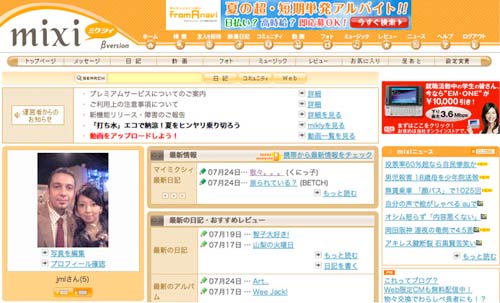社交网站Facebook进军日本市场困难重重
年仅26岁的Facebook首席执行官兼创始人马克·扎克伯格(Mark Zuckerberg)可谓是今年美国的时代人物之一。然而在全球网络最为普及的国家之一——日本却罕有人知道这一人物。
其创办的社交网站Facebook在全球拥有近5亿8300万用户,然而其中日本用户却近有200多万,不足该国网络用户的2%。这一情况与Facebook在美国的盛行大相径庭。据Socialbakers分析网站指出,美国Facebook用户约占其互联网的60%。
因此,尽管最近高盛银行投资4亿5000万美元支持Facebook进军日本社交网站市场,但这笔高额投资可能不足以攻克庞大且蓬勃发展的日本网络广告市场。
据游戏邦了解,近几年日本涌现出了数款热门的本土社交网站和游戏门户网站,如如Mixi, Gree和Mobage-town等。上述社交网站均有2000万以上的用户基础。
值得一提的是,上述3家日本社交网站都十分注重保护用户的个人隐私,实行匿名制,这与Facebook要求的实名制完全相反。因此,大部分日本网民,甚至于名人习惯于使用匿名。对此,东京Nielsen/NetRatings公司分析师Nielsen/NetRatings便表示Facebook在日本面对的挑战不仅来自于强悍的竞争对手,还源于不同与美国的日本网络文化。
Facebook日本区域经理Taro Kodama向美国Facebook总部反映了这一问题,然而目前发言人Kumiko Hidaka尚未发表回复。
为了不辜负高盛投资公司对Facebook进军日本社交网站市场的高额投资,Facebook必须拓宽其日本市场占有率。有数据显示,2009年日本网络广告市场的销售额总计约为7069亿yen(折合85亿美元)。(当然,Facebook也有意进军中国市场,然而目前中国政府屏蔽了该社交网站)。
马克·扎克伯格承诺将尽全力消除这一差距,然而实现这一目标的过程相信是十分艰巨。
首先,早在2008年日本的多家本土社交网站便拥有了近2000万用户,虽然这一数据在近年来并没有明显增长,但也仍是目前日本Facebook用户的10倍。
其中与Facebook功能相似的Mixi社交网站启动于2004年。用户可以在该社交网站上传照片,分享评论和链接等。目前,Mixi拥有约2160万用户。
其次是近年来快速发展的Gree,目前以2250万注册用户超越了Mixi。Gree面向手机用户推出了提供免费游戏的热门游戏平台,在其中玩家可以进行装扮虚拟人物形象等活动。
再次是拥有2170万用户的Mobage-town。该网站也同样提供了虚拟人物形象,游戏和配饰等功能,此外用户还可通过点击广告商的网页赚取虚拟游戏币。
而最近,上述三款日本社交网站均开始采用一些Facebook社交网站元素,如允许第三方开发商发布应用等。如此一来,日本社交网站用户就更没有必要向Facebook转移阵地啦。
另外,社交网站Mixi还采用了某些其他硅谷新兴公司的热门技术。如2009年Mixi实现用户向150个对象发送即时短信的功能,这与热门微博服务Twitter相类似。
然而Mixi等日本社交网站推出的这一服务并没有阻止大量日本用户涌向社交网站Twitter。通过与当地网络手机服务公司Digital Garage合作,Twitter用户迅速增长。据Nielsen Online NetView报导,2010年7月Twitter日本用户达1000万。当然,Twitter并不要求用户提供真实个人信息。
尽管不一定都是正面形象,Facebook和马克·扎克伯格在日本获得了大量的媒体曝光。本周,讲述马克·扎克伯格个人创业史的电影“The Social Network”在日本上映。
据游戏邦了解,近年来Facebook一直致力于打造面向日本用户的社交网站服务,如由志愿者免费翻译的日文版Facebook网站。另外去年2月,Facebook还在日本东京开设了办公室以便于开发符合日本市场的Facebook网站。(Facebook日文网站添加了血型一项,这是由于日本人十分注重血型,将其看成是个人性格的重要特征之一。)
然而却有部分用户反映Facebook日文网站使用困难。以年仅26岁的Mixi死忠用户Maiko Ueda为例,在大阪担任售票员的Ueda坚持每天登录Mixi阅读好友的“日记”(该功能类似于加长版Facebook状态更新),偶尔也会拟写自己的日记或上传宠物照片等。尽管Ueda对Facebook的“开放性”十分好奇,她却认为完全没有必要舍弃Mixi转去使用Facebook。在社交网站Mixi中,绝大多数用户都不使用真实姓名或照片。对此,Ueda也表示在其使用Mixi的5年生涯中,她从未上传过自己的真人照片。
通过2010年东京MMD实验室对2130名日本手机网民的调查显示,89%的日本用户不愿意在网上透露自己的真实姓名。对此,专家指出尽管美国Facebook用户愿意在网络中重建真实的社交环境,然而对日本人而言,他们更倾向于在匿名的情况下抒发自我,以避免职场上某些旧式思想的束缚。
在另外一份微软公司对来自亚太11个国家的3000名社交网站用户的调查显示,受访者们的网站好友中平均仅有1/4为真正的亲密好友。而过半的的日本受访者则表示社交网站中没有任何亲密好友。
在社交网站Mixi上,用户可以使用匿名注册账号,控制发帖和更新的浏览人群。另外通过“脚印”功能还能了解查看自己资料的用户。而与此相反,Facebook面向日本用户也坚持实行实名制。“Facebook注重现实生活的联系,因此请使用您的真实姓名。”
对此,日本社交媒介顾问Toshihiko Michibata认为Facebook可通过邀请名人参与等方式,教导日本用户在网络中使用真实姓名其实并不可怕,反而更实用。日本可谓是极端关注隐私问题的国家之一。在今年5月有人抱怨Facebook分享过多用户个人资料之后,Facebook采用了强势的隐私管理方式。知名博客主Akky Akimoto表示目前Facebook虽然加强了对用户隐私的管理,但在其他方面仍有不少问题。
当然,Facebook并非毫无优势——日本顾客总是对新兴事物抱有强烈的兴趣。
目前,Mixi社交网站正处“七年之痒”:去年中有三个季度的盈收呈现下降趋势,其股价也自2006年上市后暴跌了70%。
在日本电视网公司(NTV)11月的采访中,Facebook的日本区域经理Kodama表示有信心令更多的日本用户认同Facebook的实名制政策。(本文为游戏邦/gamerboom.com编译,转载请注明来源:游戏邦)
Mr. Zuckerberg, the 26-year-old Facebook chief executive and co-founder, may be the man of the moment in the United States and much of the rest of the online world. But here in Japan, one of the globe’s most wired nations, few people have heard of him.
And relatively few Japanese use Facebook, the global social-networking phenomenon based in Palo Alto, Calif., that recently added its 583 millionth member worldwide.
Facebook users in Japan number fewer than two million, or less than 2 percent of the country’s online population. That is in sharp contrast to the United States, where 60 percent of Internet users are on Facebook, according to the analytics site Socialbakers.
So even as Goldman Sachs pours $450 million into the company, Japan, with a large and growing online advertising market, is a big hole in Facebook’s global fabric.
Japanese, until now, have flocked to various well-entrenched social networking sites and game portals — like Mixi, Gree and Mobage-town. Each has more than 20 million users, and each offers its own approach to connecting people online.
One trait those sites have in common is crucial to Japan’s fiercely private Internet users. The Japanese sites let members mask their identities, in distinct contrast to the real-name, oversharing hypothetical user on which Facebook’s business model is based.
Japanese Web users, even popular bloggers, typically hide behind pseudonyms or nicknames.
“Facebook does face a challenge in Japan,” said Shigenori Suzuki, a Tokyo-based analyst at Nielsen/NetRatings. “There are powerful rivals, and then there’s the question of Japanese Web culture.”
Taro Kodama, Facebook’s manager for Japan, referred questions to the United States, where a spokeswoman, Kumiko Hidaka, did not respond to requests for comment.
One key to the growth that might help justify the $50 billion valuation that Goldman’s planned investment placed on Facebook would be to expand its presence in Japan. The overall online advertising market in the country had sales of 706.9 billion yen ($8.5 billion) in 2009. (Someday China could present another big growth opportunity. But, for now, government censors there block access to Facebook.)
Mr. Zuckerberg has promised to address the Japan gap. But it will not be easy.
To begin with, each of Japan’s own social networking sites, though no longer growing at the breakneck pace of the past few years, has at least 10 times as many users as Facebook, which was introduced in Japanese in mid-2008.
Most similar to Facebook is Mixi, started in 2004. Users post photographs, share comments and links, and interact on community pages that have become huge forums based on themes as diverse as recipe-sharing and Michael Jackson. Mixi has more than 21.6 million members.
Fast-growing Gree, which overtook Mixi this year with nearly 22.5 million registered users, has expanded by buttressing a popular game platform for mobile phones that offers free games, which users play with manga-style avatars; fancy outfits or tools for games are available for a fee.
Mobage-town, which has almost 21.7 million users, offers a similar combination of avatars, games and accessories. It also lets users earn virtual gaming money by clicking on advertisers’ Web sites.
Now, all three sites are starting to incorporate elements of Facebook — like allowing third-party developers to make apps for the sites — giving Japanese users little reason to switch.
Mixi, meanwhile, has been adapting some techniques of other popular Silicon Valley start-ups. Since late 2009, for example, Mixi users have been able to send short, real-time messages with a maximum of 150 characters, akin to Twitter, the popular microblogging service.
Such flourishes have not kept many Japanese consumers from taking to Twitter, which is catching on here at a speed Facebook may envy. A partnership with Digital Garage, a local Internet and mobile services company, has touched off a surge in Twitter users, who numbered about 10 million in Japan in July, according to Nielsen Online NetView. But Twitter does not require users to reveal their identities.
Facebook and Mr. Zuckerberg are about to get a blast of publicity in Japan, although perhaps not of the most positive sort. “The Social Network,” the movie that presents a less-than-flattering portrayal of Mr. Zuckerberg, opens in Japan this week.
Facebook has stepped up efforts to tailor its service to Japan. A Japanese version of the site, translated free by volunteers, was introduced a few years ago, but the company opened a Tokyo office in February to customize the site for Japan. (Facebook’s Japanese site, for example, allows users to display their blood types, considered an important personality trait here.)
Related
*
DealBook: Public Offering Said to Be Unlikely for Zynga This Year (January 9, 2011)
*
Times Topic: Facebook
Some users complain that Facebook’s Japanese-language site is awkward to use.
People like Maiko Ueda, 26, a Mixi devotee, see little reason to switch. Ms. Ueda, who works at a stationer based in Osaka, logs into Mixi at least once a day to read other users’ “diaries,” which resemble status updates on Facebook, albeit in longer form. She uploads pictures of her American shorthair cat, and sometimes writes about her day in her own posts.
But most people on Mixi do not know her real name, nor have they seen what she looks like. In her five years on Mixi, she has never uploaded a photo of herself.
She has heard of Facebook but says she is suspicious of “how open it seems.”
“I don’t want to give it my real name,” Ms. Ueda said. “What if strangers find out who you are? Or someone from your company?” She spoke on the condition that her Mixi user name would not be revealed.
In a survey of 2,130 Japanese mobile Web users by the Tokyo-based MMD Laboratory, 89 percent of respondents said they were reluctant to disclose their real names on the Web. Specialists say that while Facebook users in the United States tend to recreate real-life social relationships online, many Japanese use Web anonymity to express themselves, free from the pressures to fit into a conformist workplace.
In a 2010 survey by Microsoft of social network use among 3,000 people in 11 Asia-Pacific countries and regions, respondents on average said that only about one-quarter of their friends on social networking sites were close friends. In Japan, more than half of all respondents said that not one of their acquaintances on social networks was a close friend.
Mixi has grown by letting users sign up with pseudonyms, and gives its subscribers fine-tune controls over who sees posts and other uploads. Mixi also lets users closely monitor who has viewed their profiles with a function known as “footprints.”
In contrast, Facebook has insisted that Japanese users adhere to its real-name policy. “Facebook values real-life connections,” warns a message that pops up when a Japanese user withholds information, like the traditional characters used in names. “Please use your real name,” it reads.
“I think there has to be an event, a celebrity signing up for Facebook, or something else that teaches Japanese users that identifying themselves online isn’t scary and can be useful,” said Toshihiko Michibata, an e-commerce and social media consultant in Japan.
Japan could be an extreme case of the privacy issues that Facebook is tackling elsewhere. Facebook introduced stronger privacy controls in May after groups complained that it shared too much personal data.
“The dangers of too little privacy may be lost in the global Facebook fad, but it’s likely to become a growing problem elsewhere,” said a popular blogger known online as Akky Akimoto, who does not reveal his real name and refuses to be photographed in public. “I’d hate it if people on the street recognize me, without me knowing.”
Still, Facebook may have a powerful force on its side: Japanese consumers’ penchant for all things new.
With Mixi in its seventh year, it is starting “to feel old,” said Mitsuyo Nakata, a Web designer. Its growth has slowed, as have advertising revenue and investor confidence. Profits have fallen at Mixi for three of the last four quarters, and its stock price has slumped 70 percent since its initial public offering in 2006.
In an interview with the Nippon Television Network in November, Mr. Kodama, the Facebook manager for Japan, said he was confident that users would start warming to Facebook’s real-name policy once they discovered the usefulness of finding old classmates online.
“The Internet in Japan has not been so closely connected with real society,” he said. “Those other community sites can keep offering the joys of staying remote from real life.” (Source:nytimes)









































 闽公网安备35020302001549号
闽公网安备35020302001549号